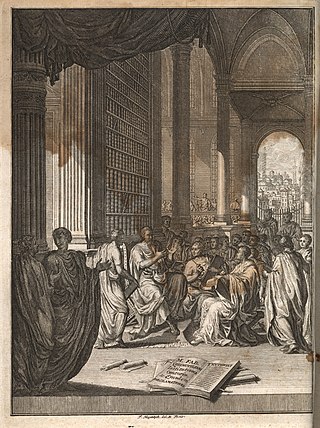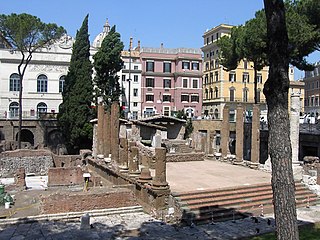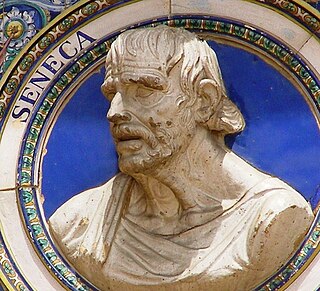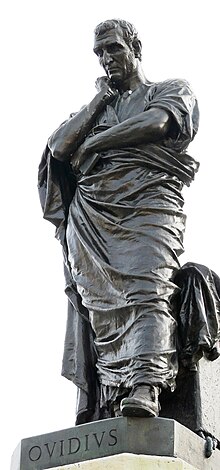
Marcus Fabius Quintilianus was a Roman educator and rhetorician born in Hispania, widely referred to in medieval schools of rhetoric and in Renaissance writing. In English translation, he is usually referred to as Quintilian, although the alternate spellings of Quintillian and Quinctilian are occasionally seen, the latter in older texts.
Lucius Annaeus Seneca the Elder, also known as Seneca the Rhetorician, was a Roman writer, born of a wealthy equestrian family of Corduba, Hispania. He wrote a collection of reminiscences about the Roman schools of rhetoric, six books of which are extant in a more or less complete state and five others in epitome only. His principal work, a history of Roman affairs from the beginning of the Civil Wars until the last years of his life, is almost entirely lost to posterity. Seneca lived through the reigns of three significant emperors; Augustus, Tiberius and Caligula. He was the father of Lucius Junius Gallio Annaeanus, best known as a Proconsul of Achaia; his second son was the dramatist and Stoic philosopher Seneca the Younger (Lucius), who was tutor of Nero, and his third son, Marcus Annaeus Mela, became the father of the poet Lucan.
Gaius Albinovanus Pedo, sometimes mistakenly called C. Pedo Albinovanus, was a Roman poet who flourished during the Augustan age.
Aufidius Bassus was a renowned Roman historian and orator who lived in the reign of Augustus and Tiberius.

The gens Cornelia was one of the greatest patrician houses at ancient Rome. For more than seven hundred years, from the early decades of the Republic to the third century AD, the Cornelii produced more eminent statesmen and generals than any other gens. At least seventy-five consuls under the Republic were members of this family, beginning with Servius Cornelius Maluginensis in 485 BC. Together with the Aemilii, Claudii, Fabii, Manlii, and Valerii, the Cornelii were almost certainly numbered among the gentes maiores, the most important and powerful families of Rome, who for centuries dominated the Republican magistracies. All of the major branches of the Cornelian gens were patrician, but there were also plebeian Cornelii, at least some of whom were descended from freedmen.

Institutio Oratoria is a twelve-volume textbook on the theory and practice of rhetoric by Roman rhetorician Quintilian. It was published around year 95 AD. The work deals also with the foundational education and development of the orator himself.

The gens Lutatia, occasionally written Luctatia, was a plebeian family of ancient Rome. The first of the gens to obtain the consulship was Gaius Lutatius Catulus in 242 BC, the final year of the First Punic War. Orosius mentions their burial place, the sepulchrum Lutatiorum, which lay beyond the Tiber.

Decimus Junius Juvenalis, known in English as Juvenal, was a Roman poet active in the late first and early second century CE. He is the author of the collection of satirical poems known as the Satires. The details of Juvenal's life are unclear, although references within his text to known persons of the late first and early second centuries CE fix his earliest date of composition. One recent scholar argues that his first book was published in 100 or 101. A reference to a political figure dates his fifth and final surviving book to sometime after 127.
Marcus Porcius Latro was a celebrated Roman rhetorician who is considered one of the founders of scholastic rhetoric.

The gens Antonia was a Roman family of great antiquity, with both patrician and plebeian branches. The first of the gens to achieve prominence was Titus Antonius Merenda, one of the second group of Decemviri called, in 450 BC, to help draft what became the Law of the Twelve Tables. The most prominent member of the gens was Marcus Antonius.
The gens Catia was a plebeian family at Rome from the time of the Second Punic War to the 3rd century AD. The gens achieved little importance during the Republic, but held several consulships in imperial times.
The gens Cestia was a plebeian family at ancient Rome during the later Republic, and in imperial times. The first member of the gens to obtain the consulship was Gaius Cestius Gallus in AD 35. The family's name is commemorated on two monuments, the Pons Cestius and the Pyramid of Cestius which survive into modern times.
Papirius Fabianus was an Ancient Roman rhetorician and philosopher from the gens Papirius in the time of Tiberius and Caligula, in the first half of the 1st century AD.

Declamation is an artistic form of public speaking. It is a dramatic oration designed to express through articulation, emphasis and gesture the full sense of the text being conveyed.

A controversia is an exercise in rhetoric; a form of declamation in which the student speaks for one side in a notional legal case such as treason or poisoning. The facts of the matter and relevant law are presented in a persuasive manner, in the style of a legal counsel.
Bruttedius Niger was a rhetor and politician of the early Roman Empire. He also wrote a historical work.
Antonius Atticus was a rhetorician of ancient Rome who lived in the age of Seneca the Elder and Quintilian.
The gens Rubellia was a minor plebeian family at ancient Rome. Members of this gens are first mentioned in the time of Augustus, and they achieved prominence during the first century, when two of them obtained the consulship: Gaius Rubellius Blandus in AD 18, and Lucius Rubellius Geminus in AD 29.

The gens Saufeia was a minor plebeian family at ancient Rome. Members of this gens are first mentioned in the final century of the Republic, and from then to the early Empire their name occurs regularly in history, but none of them ever attained the consulship.
The gens Albinovana was an obscure plebeian family at ancient Rome. No members of this gens are known to have held any of the higher offices of the Roman state, and hardly any are mentioned in history. The family is perhaps best known from Publius Albinovanus, an infamous participant in the civil war between Marius and Sulla, and from the first-century poet Albinovanus Pedo. A number of Albinovani are known from inscriptions.










